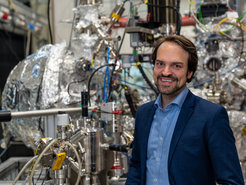Max Planck Research Group Leader Dr. Niels Schröter Appointed W3 Professor
Beginning in June 2025, Dr. Schröter will take up his new role at Martin Luther University Halle-Wittenberg while partially continuing his research at the Max Planck Institute.

The Max Planck Institute of Microstructure Physics congratulates Dr. Niels Schröter, head of the independent Max Planck Research Group for Chiral Quantum Materials, on his appointment as W3 Professor of Physics at the Martin Luther University Halle-Wittenberg (MLU). Beginning in June 2025, Dr. Schröter will take up his new role at MLU while partially continuing his research at the Max Planck Institute.
Dr. Schröter’s research bridges fundamental physics and materials science, with a focus on chiral quantum materials and their potential for enabling next-generation electronic and spintronic technologies. His professorship will further strengthen both the physics and materials science research profiles of MLU and deepen the scientific ties within the city of Halle.
Importantly, Dr. Schröter will maintain research activities at the Max Planck Institute, supporting continued collaboration between the two institutions.
"We are extremely pleased that Niels Schröter will remain in Halle and continue his outstanding research in close connection with our institute," said Prof. Dr. Stuart Parkin, Managing Director of the Max Planck Institute of Microstructure Physics. "His pioneering work on chiral materials is laying the scientific foundation for the technologies of the future. With his dual role at MLU and MPI, we are ideally positioned to advance the field together."
Since joining the Max Planck Institute in 2021, he has established a thriving research group and made key discoveries in chiral quantum materials. His work has been recognized with several prestigious awards, including the 2025 C10 Early Career Scientist Prize of the International Union of Pure and Applied Physics (IUPAP) and a 2023 ERC Starting Grant.
His appointment also supports ongoing regional research initiatives such as the planned excellence cluster “Center for Chiral Electronics,” jointly developed by MLU, Freie Universität Berlin, Universität Regensburg, and the Max Planck Institute.
With this appointment, Dr. Schröter will continue to contribute to Halle's development as a leading site for materials research, bridging the gap between fundamental physics and future technologies.












